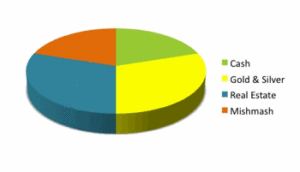The Way of Kung Fu Girl: Redefining Investing in an Age of Uncertainty

A few months ago I had the opportunity to interview an amazing and inspiring chick who happens to be a kick ass investor (making enough money from her investments to live off them if she wanted to) and a down to earth investment writer and coach. Investing is her passion and she has decided to use her talents to help people like you and me to get started.
She specializes in providing free information for people who have a bit of money and want to be smart about how they invest it. She also happens to be young, vivacious and oh, yeah, a mother of two little girls!
I’d like you to meet the woman behind Kung Fu Finance, Susan Fujii, otherwise known as Kung Fu Girl (KFG).
In this interview you will:
- Get to personally meet and understand Kung Fu Girl through her amazing story (she has definitely defined her own reality).
- Get a sneak peak into her very own investment portfolio.
- Hear her view on the global financial situation.
- Discover her top five tips on how to protect and grow your wealth now.
Benay: Susan, I am so excited to interview you for Define Your Own Reality. Thank you so much for taking the time to talk to me and my readers.
KFG: My pleasure. I love people so this is fun!
Benay: Before our interview I invited our Facebook subscribers to send in some questions. I’d like to start with this one…
Did you grow up rich or poor?
KFG: That’s a good question. I guess you could say both.
My dad died when I was three. He and my mom had just started a huge computer business. I say huge because it was huge financially. They had moved to this little town and started this business.
This was back in 1973, when I was born. At the time computers were massive. This was before the dawn of the age of personal computing. So they were bringing data processing to all of northern Michigan and in order to do that they had to lease this computer. It took up an entire room and cost about $150,000!
When my dad died my mom was $150,000 in debt and she had this little girl she needed to take care of and this brand new business with zero customers and no life insurance (because they had to cash it in to start the business). That was such a tough moment for her. I can’t even imagine how difficult that must have been.
That said, she really had a choice to make. She could continue with this business, which at the time people thought, oh my gosh, a woman running a business, let alone a computer business by herself and trying to raise this daughter – impossible. Or she could let it go.
She decided that she was going to do it and she did. We were very poor, although I never really realized this. We were very poor up until I think junior high. She finally was able to pay off that massive, staggering debt. From then on we were comfortable. I never really had to worry about money so I’m very, very grateful for that. At the same time we weren’t lavishly wealthy.
Benay: I read about that in one of your other interviews. It’s such an amazing story. Kung Fu Grandma, she’s awesome.
KFG: Yes, I could go on and on about Kung Fu Grandma!
Benay: Have you always been into finance and wealth creation?
KFG: I think like most people, I really never thought much about money or investing. You just don’t learn very much about it in school.
As long as my checking account was okay and didn’t bounce I thought I was fine. I really didn’t pay any attention to it. I was clueless. I was worse than just “dumb” about it; I was seriously ignorant.
Benay: What were your first steps into investing?
KFG: It was 1996 and I was thrust into the world of investing because my job was working for a technology company called Intel. Part of my pay was actually in stocks.
We also had this mysterious 401k that I was supposed to automatically contribute to and some day it would magically take care of me. I had no idea what I was doing. I remember looking at that 401k statement and just being clueless. I had no idea. There were probably 15 different funds we were supposed to pick from and I just chose one randomly that had five stars and thought, ‘Oh, five stars, it must be good.’
That was my first brush with investing. It also happened to be during the technology boom.
Back in 1996 everything went up, especially for technology. From ’96 to ’99 everybody thought they were a genius because everything just kept going up. I even bought more Intel and some Cisco shares, at the peak. I think the Cisco shares were $77!
After the NASDAQ crashed in 2000 I finally woke up. I realized I’d been working for six years and suddenly had nothing to show for it.
In fact, I had negative to show for it because I’d gotten extremely careless with my spending. I was almost $10,000 in debt!
I always thought I was responsible but suddenly I found myself in this position and thought, ‘Oh my gosh, what happened to me? This is terrible.’ I was really upset — that was my big ‘aha’ moment. I vowed to never be so clueless again.
Benay: Wow! So, you were in debt and feeling clueless. How the heck did you turn that around?
KFG: First, I wanted to understand a few things:
- There were people out there that didn’t get burned in that crisis. What is it that these people know that I don’t know?
- Why is it that some people just know how to make money during these tumultuous periods and other people do not?
- Why does the stock market go up and what makes it go down?
So, I got really serious about learning and I started reading every book I could on investing. I just took it from there…
Benay: What did you read?

I read every book by Robert Kiyosaki and every book he recommended, and one of the books he recommended was ‘The Creature from Jekyll Island’. I talk about it on my website, which is really about the history of the Federal Reserve and it sounds so boring and dry and dull when you talk about it like that but this book is actually written like a murder-mystery. It’s really fascinating. It’s like, ‘in the dark of night… cloaked in secrecy, these influential men snuck off to this island and changed the face of history.’ It is fascinating.
Anyway, through that I started discovering Austrian economics and Mises and Rothbard and I found Doug Casey and all of these interesting people that were really, really smart…These people had avoided that crisis and other crises before that, too.
I also took a commercial real estate course at UC Berkeley nearby, and took several certified financial planning courses. I just got very interested in finance and vowed to increase my education.
Benay: What made you start Kung Fu Finance?
KFG: A couple of things.
During this process, one thing I noticed was that there wasn’t really any website out there for investors like me.
There was Robert Kiyosaki who was great, but even he admits that he’s not very technologically savvy so he didn’t have much of a website or anything at the time. He just had his books and his game.
Then there was the Motley Fool, which was also great but it was very mainstream. That was what I was trying to get away from because they just talked a lot about all of the things that had gotten me into trouble in the first place, you know.
There was nothing out there for individual investors who were more like me—just starting out, but believing in Austrian economics and seeking out alternative investments to just the U.S. stock market. So, that was one big impetus; I felt there was a real need.
The Kung Fu part – I was taking a Kung Fu class with a girlfriend of mine up in San Francisco and at the same time I was living with these two guys, one of whom loved Kung Fu. I had gone out with him one night to some club and we had gotten home late and there were all these old Bruce Lee movies on. He loved Bruce Lee and I did too. Bruce Lee is awesome.
We ended up staying up all night and we were just talking, talking, talking and he knew I had this passion for finance. He’d been with me throughout my whole debacle. We were talking back and forth and I thought, ‘Kung Fu Finance! That’s it!’
So, yeah, I wanted to create a place where people could come and really go all Kung Fu on their finances and take action!
Benay: That’s awesome – thank you for that. OK, Here’s another question from a reader…
Would you be willing to give a breakdown of the asset classes and percentages that are in your portfolio?
KFG: Yes, but actual percentages change day to day.
Benay: How about a high level, big picture overview then?
KFG: Sure, just please realize this is my own, based on where I’m at in my life and my own personal risk tolerance. I don’t want someone to think, ‘Oh, I should go out and do exactly this,’ because it might be completely the wrong thing for somebody else.
Benay: I totally get that – only YOU know the answer to what is going to work for you.
 KFG: Great. Well, the portfolio is always changing but at the moment…
KFG: Great. Well, the portfolio is always changing but at the moment…
- We actually keep quite a bit of cash, especially right now. I’d say we’re probably about 20% cash.
- We’re maybe 30% gold and silver. We buy the physical metals. That’s a mix of bullion and stocks.
- We’re probably another 30% real estate and that’s both foreign and domestic.
- Then that last 20% is sort of a mishmash. We have some stocks, we have some commodities, some currencies. That’s our more speculative stuff. So in general we’ll do some private placements and some junior mining stocks, more speculative stuff in this segment. We don’t use the entire 20% to speculate but I’m lumping that in with the rest in there.
It does change over time. When I started buying gold and silver many, many years ago it was a very small percentage but they’ve gone up quite a bit so it become a bigger percentage just because of the fact that they’ve increased so much in value. Anyway, things fluctuate…
Benay: Are you able to live off of what you earn from your investing or do you need to have another job?
KFG: We could live off of what we earn from investing but we have two little girls that are four and six. I think if we moved to a very low cost area in the United States or in another country or something we could probably eek out a pretty decent living. But we definitely wouldn’t choose to do that right now because we have these two young girls and we want to give them great health insurance, hopefully provide a good college for them one day and get them fully out of the nest in 10+ years from now.
Plus, I think for us too it’s not even so much about the money. Of course it’s always good to have money; money buys you all kinds of things like freedom and security and safety and good health insurance and all those things.
We believe a lot in value creation. I talk about this sometimes on my site, too, but there’s a lot to be said for the good feeling you get by creating value in the world by helping other people. It’s just a good feeling. I enjoy working and so does my husband, especially if you’re able to do something like this, your own business that you’re passionate about, that you really care about and you really feel like you are creating value in the world and helping people. I can’t imagine really ever giving that up.
Benay: Amen. I think that says a lot about you and is a big part of why I like your site so much.
KFG: Thank you.
Benay: OK, here is another question from one of our readers….
What do you think of current global financial trends?
 KFG: I think we’re going to be in for an interesting ride. There’s so many what they call “potential black swans” on the horizon.
KFG: I think we’re going to be in for an interesting ride. There’s so many what they call “potential black swans” on the horizon.
One thing that my mentors – Doug Casey and all these guys – say is that there’s a difference between inevitable and imminent. Something can be inevitable but it doesn’t mean it will happen tomorrow.
I definitely think that Europe is in for a really, really rough landing. Greece is already a mess and Spain is soon to follow. Iceland is smart. They just defaulted and got back right in line. They’re happy now. Unfortunately, the rest of Europe is not following that model. It’s going to be a really rocky road. Their bonds are incredibly high, they’re having a difficult time being able to borrow money from anybody in the markets and it’s just going to be very, very difficult I think for Europe to pull out of this. They just have unprecedented levels of debt.
China, unfortunately, is looking to be much the same. I think everybody at least initially was very hopeful that China would somehow pull everybody out of this because they have so many people. For a while it seemed like their economy was booming and doing so well because they were doing all this construction. Come to find out they’ve been doing all of this construction but they’re doing it not for economic reasons; they’re doing it for political reasons. They also have a lot of debt and a lot of problems and their growth has slowed tremendously. This last quarter is the slowest growth they’ve had I think in the last five years. They’re facing a lot of trouble too, as is Japan. It’s really tough.
Here in the US we have something like $80 trillion in unfunded liabilities – social security and Medicare – and it’s just staggering. There’s literally no way we can pay it off. To try to figure out what we’re going to do with that is daunting. It’s extremely daunting. I think in the near term the US is going to look like it’s doing okay because I think all eyes and attention are going to be focused on Europe.
Europe is going to have deeper problems sooner but unfortunately I think the United States is not too far behind. I hate to say that; it sounds so gloom and doom. The good news is if we can just get past this then I think things can be good again. But I think it’s going to be a really rough road getting there.
Benay: For somebody who has just heard what you’ve said and goes, ‘Oh my gosh, this is really different from the reality that I know’. What should they do now to protect themselves?
KFG: There are five things I would recommend.
- Get EducatedI think the first thing you should do definitely is get educated, as educated as you can.
- Have Some CashThe second thing is you should definitely have some cash. One of the big fallacies of the Wall Street world is they want you to be fully invested all the time.Right now it’s not like you’re earning much yield from anything anyway. Stocks, dividend yields are not terribly high and incur more risk. Bonds are pathetic. CDs, savings account interest rates are pathetic. There are not a lot of places to go to earn “safe” yield on your money anyway, so there is nothing wrong with having cash on hand.Then if something does go, you know, the stock market crashes or there’s something else that crashes or there’s a great buying opportunity, you then have money (cash) that you can go in and take advantage of it and get a great asset at a great price. I definitely believe in having some cash.
- Have Some Gold and Silver I also definitely believe in having some gold and some silver. Probably if you’re less risk tolerant I would stick more towards gold and away from silver because silver tends to be very, very volatile. It depends on your own personal circumstances exactly how much you want to have of each.They may be in for a correction still coming this year. They’ve been rising steadily for something like 12 years. They had a correction in 2008 but other than that it’s just been straight up for a decade. A lot of people are forecasting that they may correct again a little bit more this summer (2012). That might actually be a good buying opportunity because all of these global currencies are eventually going to reach their intrinsic value, which is zero, because they’re really just paper. They’re not backed by anything of value. So I definitely think it’s worthwhile to have at least a little bit of gold and silver.
- Focus on Big Solid CompaniesThe rest, you can focus on very good, world-dominating companies that pay good dividends and that are good, solid companies with a lot of cash on hand and very strong balance sheets.I think if you do all those things you’ll be pretty well positioned to ride out whatever storm comes.
- Prepare for Bad Times and You Will Only Know Good TimesThere is a group of people who are very concerned with personal safety—the “prepper” market. I don’t know if you saw in Greece but when they went through all of those austerity measures there were riots on the streets and people died…and people are still dying over there. People are very, very angry—angry at the government, and angry at the banks. There is a lot of social unrest.If that were to happen here (in the USA) you need to think about what you could you do to protect yourself and your family. I don’t usually go into too much detail on this side of things on my site, other than financial preparations, but it is something to be aware of, yet not crazy about or anything. I live in California so we do earthquake preparedness…so I would say that type of preparation is prudent. Prepare for bad times and you will only know good times.
Benay: I can imagine that somebody who’s brand new to this kind of stuff can go, ‘Okay, I’ve never thought about investing before. I want to go get some silver and gold but how the heck do I start?’ Do you have a resource for that?
KFG: Yeah, there are actually two places I would send them:
- One is if you sign up on my site with your email address you will get my free report. In the free, special report I talk about all of these things and explain exactly how to get started. That would probably be the number one thing.
- There is also a separate page link at the top of my website in the navigation bar called ‘Getting Started‘. There I have a much more organized view of all of my articles and within there I have sections on how to buy gold and how to buy silver, etc.
Benay: Do you think it’s possible for someone to make a difference in his/her financial situation with just a couple of hours a week?
KFG: Definitely, yes.
For example, you could probably read my articles in 15 minutes or less a week, and that’s at least a start. I’m certainly not professing to be the “be all end all” whatsoever but there is so much you can do in just an hour a week.
A lot depends on where you are starting from but if you can just set some goals for yourself and really break them down into bite sized chunks, you will be amazed at what you can do in just 15 minutes a day or one hour a week. You really can make a difference in your life.
It’s a matter of focusing your attention on your finances for just a little bit. Here’s a technique that I think really helps people – set a timer. For example, you can set a timer for 15 minutes and go through as many receipts as you can. When your timer goes off, stop and move on. That way you’ll begin to trust yourself and not dread doing things you are afraid to tackle—you can do anything for 15 minutes! You don’t have to spend hours doing it every day.
Benay: I love that one. I think that’s a perfect place to end, too. That’s the seal I was looking for.
Thank you so much.
If you’ve made it through all 4,000+ words that make up this article – I’m impressed but not surprised. Susan is an amazing person and a woman worth keeping an eye on. Since our interview, conducted in June 2012, she has being kicking butt and making serious waves in the world of investment writing. Go all Kung Fu on your finances now.
During our interview (which was only 1 hour!) I got a few more insights from Kung Fu Girl that will appeal to those of you who are running your own business. She shared her views on what it takes to run a passion-based business, which you can find here.
2 Comments
Submit a Comment
You must be logged in to post a comment.




Thank you Benay!
It was such a pleasure to talk with you and get to know you, and I wish you the BEST of success on your business– what an amazing and important mission.
Thanks again!
Susan (KFG) 🙂
Likewise Susan. I know you go to every cool entrepreneur event out there – if I play my cards right maybe we’ll be crossing paths again soon!
You Rock.
-B